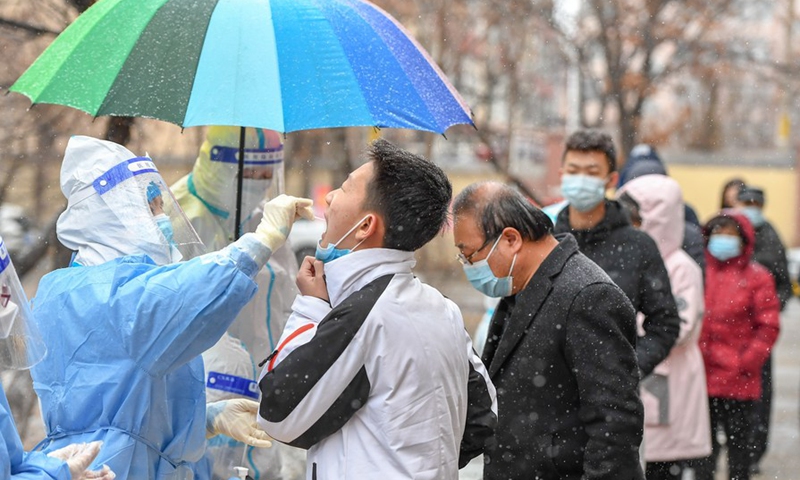Two cities in Jilin isolate communities and launch citywide testing as infections continue to soar
A medical worker takes a swab sample from a resident for a nucleic acid test at a community in Jilin city, northeast China’s Jilin Province, March 12, 2022. Photo: Xinhua
The cities of Changchun and Jilin in northeast China’s Jilin Province sealed off all residential communities and launched three-day nucleic acid testing across the city as the epidemic situation in the Jilin province continues to worsen, with nearly 1,500 new infections recorded on Saturday.
With tougher measures in place and more rounds of nucleic acid testing to find potential carriers of the virus, health experts have estimated the latest outbreak in the province could see a turning point in mid-April.
The two cities, which have been hardest hit by the coronavirus, stepped up prevention measures over the weekend. The government of Jilin city, which has a population of more than 2 million, announced on Sunday that it would place all residents under “static management” from midnight Monday to Friday, which means residents cannot go out from their homes or residential compounds during this time. Control Zone residents can order daily supplies online every two to three days.
Changchun also updated restrictions on residential communities on Saturday. Except for medical staff, community workers, volunteers and other anti-epidemic workers, all residents are required not to leave their residential compounds during the three-day mass testing, the local government said.
People in home quarantine can have daily necessities delivered by community workers and volunteers to their doorstep.
Other residents can go to some specially set up sites to pick up things they ordered from residential compounds in groups, under the organization of their communities, the Changchun government announcement said.
Jilin Province on Sunday reported 1,191 new local confirmed cases and 303 asymptomatic patients, with most cases concentrated in its capital Changchun and Jilin city.
As the region hardest hit by the latest outbreak in China, Jilin Province has recorded more than 10,000 infections since March 1.
Jing Junhai, Party chief of Jilin Province, told a conference on Saturday evening that the province was at a key stage in a tough battle against the virus.
“The anti-epidemic work in Jilin has entered the home stretch, where all prevention and control measures should be carried out in an orderly, powerful and efficient manner so as to dynamically eliminate cases to zero as soon as possible,” said Jing said.
The rapid expansion of the epidemic in Jilin is mainly due to the spread of the dominant Omicron mutant strain in the region, which makes it more difficult to trace the origins of infections because there are more patients without symptoms who can quickly transmit. the virus to others. , Zhang Boli, a Chinese epidemiologist and academician of the Chinese Academy of Engineering, told People’s Daily on Saturday.
Zhang predicted that Jilin’s epidemic curve may flatten in mid-April, but “stable” does not mean absolutely no cases, just no new infections in the community.
“Seven days after finding no new positives, the province can then fully open up,” he said.
Jilin provincial government officials have called for ensuring the supply of goods and materials to residents, as well as further improving the efficiency of nucleic acid testing and accelerating the procurement and renovation of isolated rooms for residents. patients with COVID-19.
Zhao Jiyang, a staff member at one of the 60 stores of the Eurasia supermarket in Changchun, told the Global Times on Sunday that people can either order vegetables, fruits and other staples through group purchases. , or order them through the WeChat mini-app, where they can buy many other types of goods, such as baby diapers.
The supermarket will send the goods from the nearest store, he said.
An official named Zhang in charge of group purchases at another supermarket chain called Xintiandi in Changchun told the Global Times that it started delivering goods to customers on Saturday night and the government was building more temporary tents there. outside each residential complex to receive goods from stores, which will be brought and distributed to residents by community workers and volunteers.
Jilin provincial authorities have also insisted that prompt treatment be provided to the elderly, children and pregnant women who have medical needs as well as critically ill patients through a “green channel”.
Two deaths were reported in Jilin on Friday. It caught the attention of Western media, which claimed them as “China’s first COVID deaths in about two years”, and it was used by them as a way to exaggerate the severity of the latest virus outbreaks in China.
However, Jiao Yahui, an official with the National Health Commission, clarified at a press conference on Saturday that the direct cause of death in the two cases, aged 65 and 87 respectively, was not due to infection with COVID-19, but to the underlying disease. illnesses they had. The official added that one of the patients had not been vaccinated.


Comments are closed.